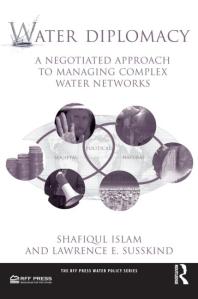Blog Archives
Water, Water Everywhere? A Method for Managing a Constrained Resource
By all appearances, we are living in an increasingly resource-constrained world. This is particularly true of water, which promises to be a continuing source of conflict among nations and water users of various kinds. But is it possible to forge a new way of thinking about water, one that looks at water rights as an opportunity for mutual gain rather than as a zero-sum competition?
In our new book, Water Diplomacy: A Negotiated Approach to Managing Complex Water Networks, Shafiqul Islam and I propose a new framework for managing water resources that emphasizes negotiation and collaborative decision-making. We note that the dominant model for managing water rights—a systems-based approach that determines optimal managements strategies through quantitative means—is increasingly inadequate for dealing with the messy interactions between science and policy. Instead, the complexity of water management demands a negotiated approached that accounts for the practical difficulties of responding to natural, social, and political considerations simultaneously.
In suggesting this, we step outside the traditional way of thinking about water rights, a zero-sum competition steeped in game theory where hostile actors vie over a limited resource. Instead, we suggest that water be treated as a flexible and frequently noncompetitive resource, and that it be managed through a collaborative process that aims to achieve mutual gains for all parties involved.
Water Diplomacy lays out this new method of water management, and includes an analysis of water management theory to date as well as a model role-play simulation intended to educate readers and stakeholders about the Water Diplomacy Framework. It is available through Routledge and Resources for the Future Press.
